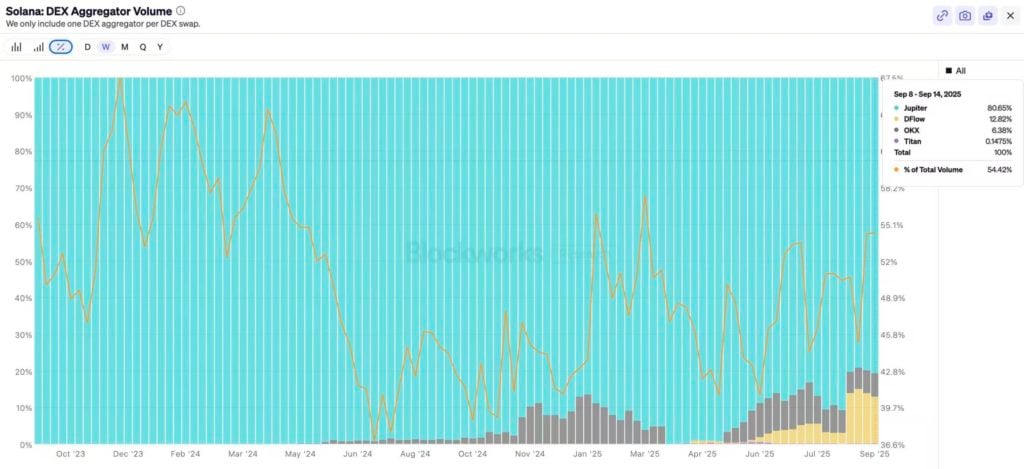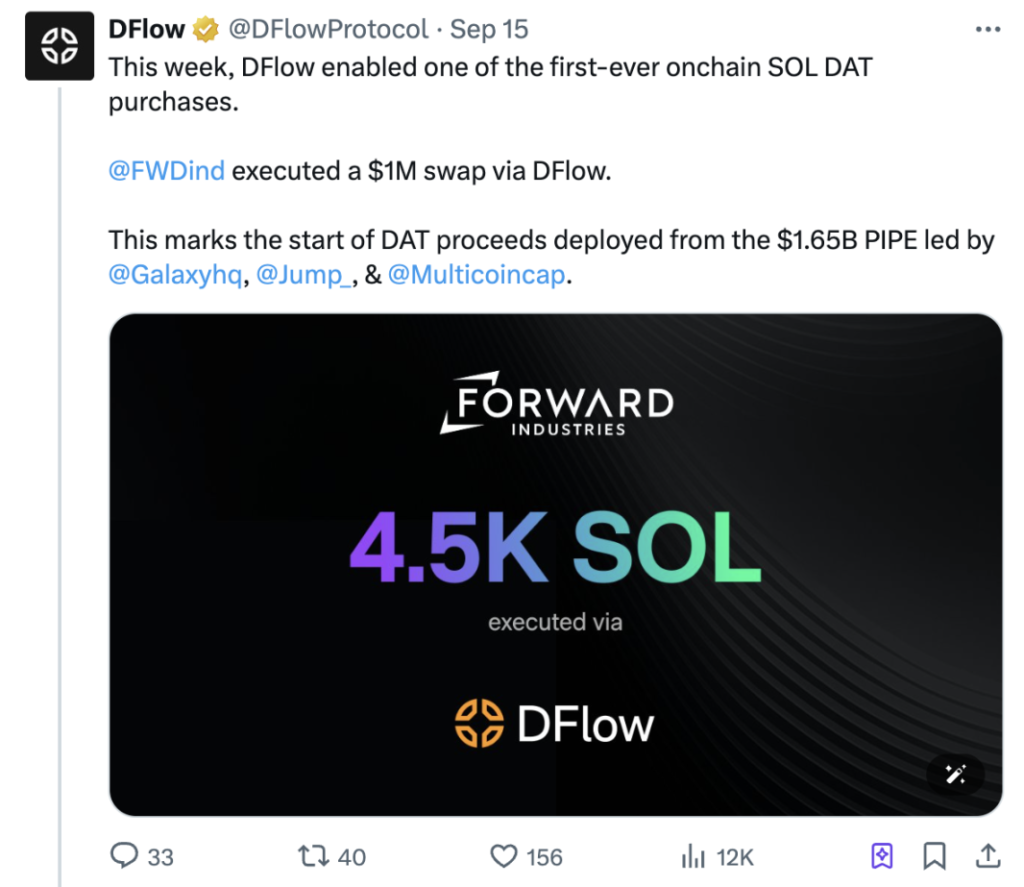From its launch in Q4 2021 until the end of Q1 2024, Jupiter held 100% of the DEX aggregator market share on Solana. Starting in Q2, the built-in aggregator within the OKX wallet gained a small share. DFlow began to appear in statistical charts in April of this year. While its market share in April alone was just over 0.6%, by last month, that figure had risen to nearly 8.5%. Over the past two weeks, DFlow's market share has stabilized above 10%.

In 2022 and 2023, DFlow completed two rounds of financing, raising $2 million and $5.5 million respectively. Investors included well-known market makers such as Cumberland DRW and Wintermute. DFlow's founder, Nitesh Nath, previously worked as a quantitative researcher at Cumberland DRW.
It's not difficult for a newly emerging DEX aggregator to capture market share through operations and marketing, but the emergence of DFlow does offer market makers the potential to earn more revenue while also providing users with better prices. To understand what DFlow is doing, we first need to discuss "conditional liquidity."
Conditional liquidity is DFlow's proposed mechanism for distinguishing the nature of order flow. Its core principle is to introduce a third-party "segmenter" to determine whether the user placing an order is a human or a bot, and whether it is an ordinary user or a large institution with superior information. The criteria for this determination are straightforward, including transactions connected to a browser plugin wallet or placed through an aggregator, as well as tools like Cloudflare to determine whether the transaction is a direct human transaction. This allows DFlow to directly reject MEV transactions while also providing differentiated services for different transaction objects.
Unlike other aggregators, DFlow doesn't accept all transactions. Instead, it determines the user's type before deciding whether to accept the transaction and how to accept it. DFlow also has a unique design for how to accept transactions.
This unique design is essentially "order flow monetization," a model that has helped Robinhood become a popular online brokerage. Simply put, Robinhood doesn't transmit user orders directly to an exchange. Instead, it provides them to large market makers, who then pass a portion of the profit margin they earn from the spread between the orders back to Robinhood. This model is known as "payment for order flow" (PFOF).
Let's take an example: Suppose stock A currently has a bid price of $50 and an ask price of $50.25. Robinhood receives a buy order for 100 shares and a sell order for 100 shares. Normally, the buy order would be filled at $50.25, and the sell order would be filled at $50. However, if you have access to both orders, you can buy the sell order at $50.10 and then sell the shares you just bought to the buy order at $50.15.
In this way, the seller gets $10 more, the buyer saves $10, and you, as the matchmaker, earn a $5 difference, making all three parties a winner. Large market makers typically hold vast amounts of cash and stock. Robinhood transmits user orders directly to market makers, who then process them internally and pass a portion of the profit from the price difference to Robinhood. This is the direct reason why Robinhood does not charge transaction fees.
At this point, we can more clearly understand DFlow's design philosophy: it capitalizes on the bid-ask spread that exists even on DEXs. The Swap API provided by DFlow allows wallets to customize the bid-ask spread for both regular user orders (non-toxic order flow) and toxic order flow (including large institutional orders that receive advance notice of potential market trends due to information gaps). It also allows wallets connected to the API to receive a percentage of the spread and choose whether to share this profit with trading users.
Based on the nature of order flow and the bid-ask spread, we can further optimize execution prices and minimize market maker losses caused by toxic order flow, allowing various AMMs to obtain higher profits or reduce losses through DFlow. This motivates AMMs, especially the prop AMMs mentioned in "Quietly Taking Over 40% of DEX Shares, Revealing the "Hidden Champions" on Solana," to provide better quotes.
DFlow offers two trading modes: declarative swaps and imperative swaps. Imperative swaps directly execute trades using a calculated optimal path and are suitable for trades that require immediate execution or a specific path. The declarative swap process is relatively complex. When a user wishes to trade, DFlow first presents the "worst possible outcome" and maximum slippage based on quotes from reliable DEXs. If the user agrees, DFlow will first secure the desired assets through a contract and then utilize a conditional liquidity mechanism to select the optimal quote and execution path.
Declarative trading relies on conditional liquidity, requiring only regular users. Otherwise, delayed quotes from market makers could be exploited by toxic order flow, resulting in losses for the market maker. For regular users, even a slightly higher spread in actual execution wouldn't significantly impact their trading volume due to low volumes.
DFlow's conditional liquidity and declared trading mechanisms provide prop AMMs with an opportunity to tap into the long-tail asset market. Due to the volatile prices of long-tail assets, market makers can easily incur losses. DFlow's mechanism allows prop AMMs to participate in relatively less volatile long-tail assets. By delaying quotes and matching order flow, they can provide better quotes during periods of low volatility and generate additional revenue through active market making.

Previously, DFlow executed a portion of the SOL purchase order from DAT company Forward Industries, demonstrating its growing influence. Its close ties with market makers, coupled with its ability to offer better quotes than typical aggregators, make DFlow's unique mechanism design a powerful tool for gaining market share. However, as DeFi becomes increasingly professionalized, whether we should celebrate or worry remains a question worth pondering.








